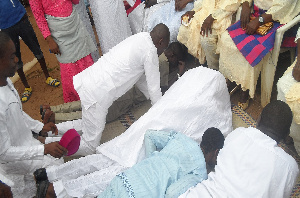“What’s for breakfast this morning, I just woke up and I’m hungry.” One may get away with this statement early in the morning after waking up from bed in just about any home, but not African. Greetings are an important aspect of African culture and apart from opening doors to cordial relationships, their meaning goes deeper and beyond being a gateway to cordial relationships.
In a traditional African home, such a comment might be met with a “Wham!” If you were lucky, you might receive a slap, but even worse, you might endure a tirade and torrent of insults all day long because you failed to extend a hand of greeting.
Generally, a salute, fist bump, bow and curtsy and others are the way men and women greet each other. Among the French, there’s the exchange of pecks, but in Africa, greetings vary from tribe to tribe and from community to community. In different countries and among different tribes in Africa, prostrating and kneeling are the ways men and women greet respectively and they all have different meanings.
South Africa
The most common greeting form in South Africa is a handshake, followed by eye contact and a smile. This is acceptable among the majority of South Africans. Handshakes may be light or firm dependent on the individual you are making small talk with and your relationship with them. Many people in rural villages greet with two hands.
When shaking hands with people of the opposite gender, it is customary for women to extend their hands first. Usually, men hesitate for women to extend their hands first. If people know each other well, they may greet with a hug. It is polite to engage with people by their titles and last name until they indicate otherwise.
Baganda tribe
Kneeling is practiced in a wide variety of contexts in Uganda. It is primarily practiced by the Baganda tribe, the country’s largest. When greeting and serving her husband, a Muganda woman must kneel. Women also get down on their knees to say hello to other men and the elderly. In most cases, this occurs wherever there is an encounter at home, in the garden, on the way to work, and in the bank.
However, this practice is extremely frowned upon because it is perceived as forced humility and a form of discrimination against women. Women are culturally compelled to kneel during traditional wedding ceremonies in order to place a special identifier (flower) on the lapel of the groom-to-be jacket.
Yoruba
Prostrating as a way of greeting is termed Idobale, which means to meet the earth. It is seen as a symbol of planting and fertility. Yoruba men prostate as a way of greeting and it is done before an older person. The custom denotes honoring or giving respect to a higher authority. A young person who bows to an elderly person is regarded as having received good training. Prostrating helps tame the societal ego’s irrational tendency and promotes social humility.
Idobale is performed in different aspects of culture. A fundamental feature of a Yoruba traditional wedding is Idobale. The groom and his buddies are required to bow before the bride’s family and in-laws at the traditional wedding. This demonstrates the groom’s regard for his future in-laws. Additionally, it shows how much he adores and cherishes his future bride.
When someone is submitting to a monarch or other authority figure, another aspect of idolatry is revealed. According to the cultural convention, you cannot bow or stand while addressing a crowned monarch. No matter your age or social standing, you must kneel to welcome the king because it is improper to shake his hand or just bend. King’s respect is demonstrated by bowing down to greet him. It is thought that doing so will incur the King’s blessings.
But all of this is for men, for women, when greeting, kneeling is the right way and it is termed as Ikunle, which means to fill the earth and like Idobale, it is also a symbol of fertility. It signifies harvest too. Women kneel to greet when speaking to their husbands and older people. Again, during traditional Yoruba weddings, women kneel when greeting their in-laws and parents and before they sit with their husbands.
There is another aspect of Ikunle known as Ikunle Abiyamo. Ikunle Abiyamo is either just the traditional Yoruba act of giving birth while the pregnant mother is on her knees or a combination of acts in the latter stages of labor. Abiyamo means “mother” in the Yoruba language and during childbirth, Ikunle is mostly the preferred position. So for women, the greeting position is not just for greeting, but for childbirth too.
Source: face2faceafrica.com
 Home Of Ghana News Ghana News, Entertainment And More
Home Of Ghana News Ghana News, Entertainment And More





